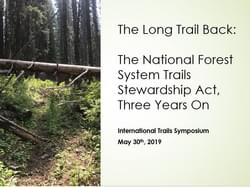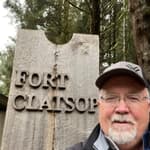The Long Trail Back: The National Forest System Trails Stewardship Act, Three Years On
A Core Track Presentation
In this presentation the panelists discuss how the U.S. Forest Service is mandated to increase the role of volunteers and partners in trail maintenance activities.
by
Deb Caffin, Trails Program Leader, Southern Region, Atlanta, GA, USDA Forest Service,
Randy Rasmussen, Director of Public Lands and Recreation, Back Country Horsemen of America,
Paul Sanford, National Director of Recreation Policy, The Wilderness Society,
Randy Welsh, Executive Director, National Wilderness Stewardship Alliance

The National Forest System Trails Stewardship Act (PL 114-245), signed into law in late 2016, directed the U.S. Forest Service to improve national forest trail maintenance by increasing the role of volunteers and partners in trail maintenance activities. The Act carried strong bipartisan support and included the ambitious goal of doubling the amount of trail maintenance performed by volunteers and partners within five years.
This session will examine how the agency has responded to this mandate and challenge, review several innovative ideas that have been implemented, and evaluate the prospects for meeting the Act’s goals. Join a discussion led by experts on the Act and on efforts to ramp up volunteerism in the service of trails on the national and regional levels. You'll have an opportunity to offer your observations, recommendations on additional steps needed to ensure that our national forest trails remain safe, accessible and enjoyed by all.
Learning Objectives:
- Participants will be able to recite a litany of negative effects that might be expected when trails are not properly maintained.
- Participants will learn about programs and strategies that have been explored at the national and regional level to engage volunteers and partners.
- Participants will be asked to discuss their ideas for methods to better engage volunteers and partners in trail maintenance, and offer an assessment of whether the goals of the Act will be realized.
|

About the Authors
Debbie received her Bachelor’s Degree in Wildlife Ecology from the University of Florida and her Masters of Science in Parks, Recreation and Tourism Management from Clemson University. A native Floridian, she began her career with the State of Florida as a Recreation Planner working first in trails then on the State Comprehensive Outdoor Recreation Plan.
In 1991 she joined the U.S. Forest Service as Trail Coordinator on the National Forests in Florida in Tallahassee working closely with the Florida Trail Association on the Florida National Scenic Trail. Debbie moved to Atlanta in 1998 and worked for the Washington Office during the development of the corporate trails database. In 1999 she became the first Intelligence Coordinator at the Southern Area Coordination Center (SACC) supporting response efforts to natural disasters. She moved back into recreation in 2001, working as the Regional Wilderness, Wild and Scenic River, Congressionally Designated Areas, non-motorized trails, and dispersed recreation program specialist. In 2011, she became the regional Trails Program Manager, working on both motorized and non-motorized trail issues.
She has previously served the Region as the Acting Deputy Forest Supervisor on the Chattahoochee-Oconee NF and the National Forests in North Carolina, and as the Acting Recreation, Wilderness, Heritage and Volunteer Unit Director.
Debbie’s hobbies include just about anything related to outdoor recreation!
Contact: [email protected]
Since 2012, Randy has represented Back Country Horsemen of America—a widely respected national, non-profit volunteer service organization, www.bcha.org. He assists BCHA’s 32 state organizations to advance policy initiatives and strengthen partnerships to ensure that current and future generations will continue to enjoy access to back country and Wilderness experiences. Prior to joining BCHA, Randy was senior policy manager for the American Hiking Society and worked for other national, non-profit organizations. He was a founding board member of Trailkeepers of Oregon, a volunteer trail maintenance organization. Randy earned a Masters of Science degree in Natural Resources, Recreation & Tourism at Colorado State University with an emphasis in public lands and wilderness management.
Contact: [email protected]
Paul Sanford is the National Director of Recreation Policy at The Wilderness Society, where he manages TWS' recreation policy agenda and its programs to connect more people to the outdoors. A native of Cleveland, OH, Paul has a Law degree from the University of Toledo and a Bachelor's degree from Ohio University. Paul began his recreation career in 2004 as the Policy Director at the American Canoe Association. He came to The Wilderness Society in 2011 because he believes in the deep connection between people and place that is forged by recreation on public lands, and knows that people can enjoy wilderness while at the same time ensuring its protection. Paul has been recognized for his leadership by the Coalition for Outdoor Access and the Outdoors Alliance for Kids. In his spare time, Paul hikes the trails and paddles the waters of the Eastern U.S. as often as possible.

Randy Welsh is the Executive Director of the National Wilderness Stewardship Alliance (NWSA). He is recently retired from the US Forest Service after a 36 year career, having served in protected area management with emphasis on wilderness and rivers. Randy spent time in Washington DC as the National Program Leader for Wild and Scenic Rivers and as Assistant Director of Recreation, Heritage and Volunteer Resources. He was a Regional Wilderness Specialist in the Intermountain Region working on wilderness and rivers issues for over 16 years before moving to Washington. Married, with two grown daughters, Randy recently moved to Bend, Oregon, and enjoys river trips, wilderness hikes, and visits with friends and family.
Contact: [email protected]
More articles by these authors
More articles in this category
Making Transportation Planning Applicable in Tribal Communities Research Study: Final Report
posted Dec 20, 2023
The Federal Highway Administration’s (FHWA) Office of Tribal Transportation (OTT) planning staff have observed two challenges in Tribal transportation planning: (1) that existing planning analysis tools do not always align with Tribal community context and needs and (2) it is not always clear what benefits planning provides to transportation project selection and delivery in Tribal communities.
Tribal Engagement Roadmap
posted Dec 20, 2023
The U.S. Department of Agriculture (USDA), Forest Service is recognized as a leader among Federal land management agencies in partnering collaboratively with American Indian and Alaska Native governments and indigenous communities. The Forest Service Research and Development (R&D) Deputy Area recognizes that working with tribes and indigenous groups is vital to its mission to develop and deliver knowledge and innovative technology to improve the health and use of the Nation’s forests and grasslands— both public and private.
Strengthening Tribal Consultations and Nation-to-Nation Relationships
posted Dec 20, 2023
The Tribal Relations Program strives to enhance relationships between the Forest Service, Tribes, ANCs, non-federally recognized Tribes, and Native Hawaiians, as well as American Indian, Alaska Native, and other Indigenous individuals, communities, inter-Tribal organizations, enterprises, and educational institutions, thereby improving the agency’s ability to foster effective partnerships and respect Tribal sovereignty.
809 views • posted 06/05/2019




